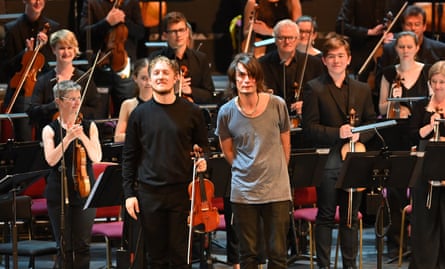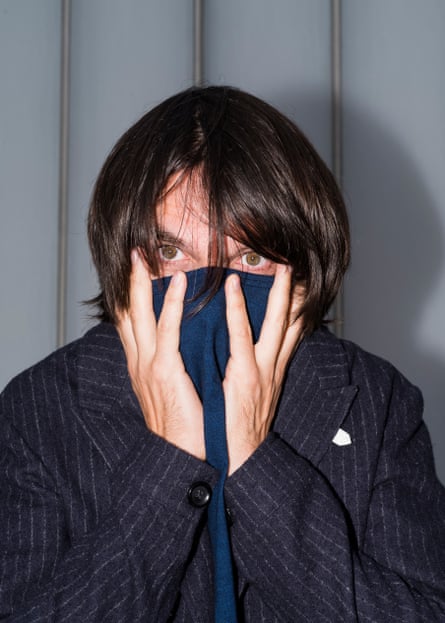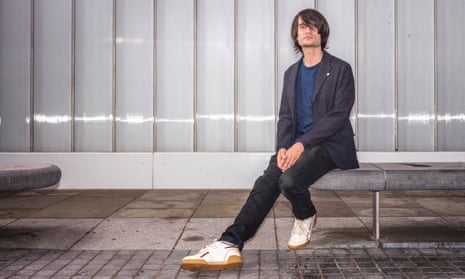Jonny Greenwood is looking well, all things considered. There’s a thin triangle of stubble on his top lip that the morning razor has missed and a slight bleariness around the eyes, but it’s unlikely anyone spotting Radiohead’s lead guitarist in the corner of this London cafe at 10am would guess that he hasn’t been to bed for 24 hours. “No, not really had any sleep,” he mutters, running a hand through his shiny dark hair. “Hour, maybe?”
The Guardian’s product and service reviews are independent and are in no way influenced by any advertiser or commercial initiative. We will earn a commission from the retailer if you buy something through an affiliate link. Learn more.
He’s here to discuss his new classical music record label, Octatonic, but at midnight he was taking a bow at the Albert Hall following a meticulously curated Prom. It was the culmination of his second life as a composer, a 16-year career that has seen him write for the London Sinfonietta, work as composer-in-residence for BBC Concert Orchestra, collaborate with the Polish composer Krzysztof Penderecki and create remarkable scores for the films of Lynne Ramsay and Paul Thomas Anderson.
The Prom included three of Greenwood’s compositions, plus works by Penderecki, Steve Reich and Heinrich Biber (“That was well Radiohead!” surmised two lads in the bar at the interval) and ended with the world premiere of Horror Vacui, his 36-minute piece for 68 strings and solo violin.
“It was crazy,” he says, of hearing the work performed in public for the first time. “Totally different from recording with Radiohead. You’re planning for something that’s going to happen just once. The focus is on 30 minutes of performance, and that focus lasts for nine months. There’s maybe 20 bars I’d happily take out, but unlike a lot of things I’ve written this felt like there was more successful stuff in it than not.”

Greenwood is humble when talking about his music, and he’ll happily change the subject from himself to the performers (“real musicians”) and his star violinist, Daniel Pioro. “Daniel is superhuman. I first saw him when he was performing this Gerald Barry piece, Triorchic Blues, and it was the last time someone’s played something that has given me this incredible physical response, this insane rush. It’s a moment I’m still chasing. I’ve been obsessed with Daniel ever since.”
That obsession is evident in Octatonic’s first release. Although the series will mainly focus on contemporary classical music, Volume 1 features Pioro playing Bach’s Partita No 2 in D minor, one of the most beautiful – but most performed – pieces of music ever. Greenwood agrees. “It has everything, and with Daniel it sounds like a fresh piece of music.”
Named after his favourite eight-note musical scale (“Yeah, I know – nerdy”) Octatonic also plans to focus on intimate works by soloists or small groups. Volume 2 features Oliver Coates performing Industry, Michael Gordon’s work for cello and electronics, and pianist Katherine Tinker playing Greenwood’s Three Miniatures from Water.
The idea for Octatonic, explains Greenwood, came after a late-night visit to Bleep, the hip online independent record shop. “I was looking for the classical section,” he says, “and I realised there isn’t one. It’s not that I thought there’d be a massive interest in new classical music on vinyl, but I thought there’d be something.”

Somewhat controversially, given that classical music is one of the few genres keeping CD sales alive, Octatonic releases will only be available on vinyl and download. “Most people I know stream their music,” says Greenwood, “and if they really like it, they might buy the vinyl. There is something about listening to it on vinyl – you feel compelled to hear the whole thing. It’s an event in itself. We use old tube mics, looking for warmth and musicality above detail, but other than that it’s all about the players.”
Mica Levi is high on his list of new composers whose work he hopes to release. “She’s amazing. In the rock world, there’s lots of bluffers. It takes one to know one, right? But sometimes you see the real thing, and Mica is it. So is Edmund Finnis. Theirs is really good writing.”
Isn’t running a classical music label less exciting than playing guitar in Radiohead? “People assume it’s this fuddy-duddy world,” Greenwood says. “But a violinist can do more with their bow hair than anyone can with a guitar or synthesiser. Then their left hand, each of their fingers … a whole universe of sounds.”
He insists this enthusiasm isn’t only about the superiority of classical instruments to electronics: “I’ve seen bands set up by plugging a lightning cable into an iPad and that’s the show. And modern electronic music can feel like that to me sometimes. Where’s the effort? What’s at stake? It seems to be lots of men, standing around watching another man, and no one’s dancing and there’s not much joy. I don’t think classical music is old-fashioned at all, especially when 20-year-old kids are doing it. I haven’t played with musicians like this since school days. It’s so exciting.”
Paul Thomas Anderson sent me some film clips and I thought: 'It's going to be nice to be in a band with this person'
Like so many children, Greenwood’s first instrument was the recorder. Unlike many of us, however, he fell in love with his. He played baroque music in teenage recorder groups, then joined Thames Vale Youth Orchestra, where he developed a love for Sibelius and Messiaen. But the power of the humble recorder never left him.
“Oh I could easily talk for an hour about the recorder!” he says. “One of the great joys of playing American sports arenas with Radiohead is their amazing communal showers. I’ll get to the venue early, seek out these rooms that smell of Deep Heat and jockstraps, get out my recorder, play one of Telemann’s canonic sonatas and just be swamped in this flattering reverb. I have fantasies of putting demands on the rider. You know, instead of cocaine and call girls, hook me up with a really good amateur recorder group. It’s sick, isn’t it?”
Greenwood joined Radiohead when he was 14, to play harmonica. He has subsequently been the group’s guitarist, keyboardist and arranger, with a freedom to incorporate everything from banjo to harp into their sound. It is Greenwood’s love of Penderecki that inspired the Mellotron on Exit Music for a Film, and his decision to employ Messiaen’s favoured keyboard, the ondes Martenot, on How to Disappear Completely.
“That’s still my job,” he says, “turning up with some new and exciting instrument. The only difference between the guitar and the ondes Martenot is that you end up playing one more often because of touring.”
Greenwood also showcased his love of the ondes Martenot in 2005, when he premiered a 20-minute work, Popcorn Superhet Receiver, with the BBC Concert Orchestra. It caught the attention of director Paul Thomas Anderson, then working on There Will Be Blood. “I hadn’t seen any of his films,” says Greenwood in a stage whisper, “but he sent me some clips and I thought, it’s going to be nice to be in a band with this person!”
His music for Anderson’s 2012 film The Master is brilliantly unnerving. He saw Anderson at the Prom, he says, “throwing out a hundred film ideas … A horror film was something we discussed.” He pauses. “But I suppose There Will Be Blood is horror in its own way. Even Phantom Thread: the innocent village girl brought to the evil old man’s house at the top of the hill. But when you sit and watch PT’s films with him, you realise they’re all comedies. He’s literally chuckling away through the whole thing.”
Greenwood’s work as a composer has greatly benefited his working relationship with Radiohead. “I’m less fearful of getting strings in now,” he says. “With Burn the Witch, I finally had the gall to say, let’s leave this completely unfinished and let the strings finish it. In the past, I wouldn’t have had the brass neck.”
As for future Radiohead plans, there are none. Since June, when the group released MiniDiscs [Hacked] – 18 hours of material from their OK Computer recording sessions – activities have been quiet. “I don’t know what we’re doing,” he says, with an apologetic smile. “We don’t tour until we’ve got new music and new music doesn’t happen until we get together and that doesn’t happen until everyone’s free.”

The group donated the profits from MiniDiscs [Hacked] to Extinction Rebellion. Greenwood agrees that environmental awareness has improved since the early 00s when Radiohead began campaigning for Greenpeace, but is reluctant to see the group as a standard-bearer. “Are you saying our legacy will be, ‘We warned you it was going to be terrible, and now it is?’ Wow. Good times.”
He also thinks criticisms of campaigners, such as Radiohead, who regularly use air travel to work, are often deployed to distract from the bigger picture. “Yes, this person is a hypocrite because they flew. But if picking holes in someone’s green credentials is all you need to convince yourself there’s no climate change problem then you’re kind of an idiot.”
As we leave, a Julia Holter track is playing over the cafe speakers amid the clatter of brunch. “There was something Alan Bennett said,” says Greenwood, as he puts on his coat, “about music having burst its banks. It used to be in these little confined spaces where you’d seek it out and have an experience. This music playing now was recorded by people concentrating on it. But we’re just kind of talking over it. One of my hopes for Octatonic is that it’s a way to hear people playing closely, create that little space, and the next time you’re walking past a poster for a concert in a church, or some solo violin music, you might want to pop in and seek out the real thing.”
Volume 1: Partita No 2 in D minor and Volume 2: Industry, Water are out on Jonny Greenwood’s Octatonic Records.

Comments (…)
Sign in or create your Guardian account to join the discussion